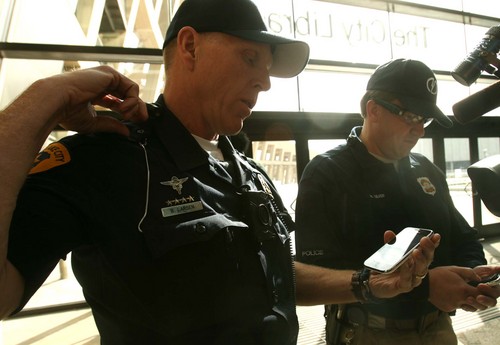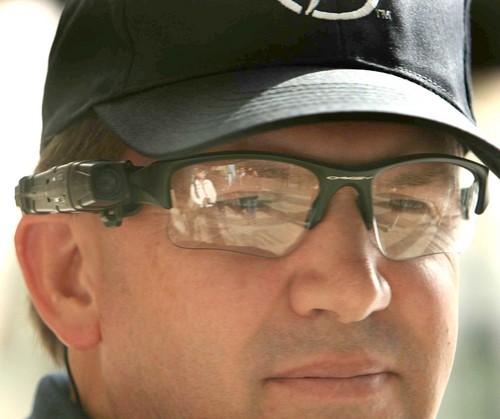This is an archived article that was published on sltrib.com in 2014, and information in the article may be outdated. It is provided only for personal research purposes and may not be reprinted.
More than 80 percent of Utahns believe police officers should be required to wear body cameras while on the job, according to a new UtahPolicy.com poll.
According to the poll — which was conducted by Dan Jones & Associates and surveyed 406 people — half the respondents said they "strongly agree" that officers should wear body cameras, while 33 percent responded with "somewhat agree."
UtahPolicy.com's website says the survey was conducted Aug. 26-28 and had a margin or error of plus or minus 4.9 percentage points.
Along with questioning respondents about police in body cameras, the UtahPolicy poll also asked questions about police use of force. According to the results, 18 percent "strongly agreed" that police are too quick to use deadly force, while 23 percent "somewhat agreed." Thirteen percent were neutral, while 24 percent "somewhat disagreed" and 20 percent "strongly disagreed."
When asked if they were concerned about police brutality, 19 percent said they were "extremely concerned," 20 percent were "fairly concerned" and 27 percent were neutral. Twenty percent said they were "slightly concerned," while 13 percent said they were "not concerned at all."
The survey was conducted in response to the Aug. 11 fatal shooting of 20-year-old Dillon Taylor, according to UtahPolicy.
The Salt Lake City police officer who shot and killed Taylor outside a South Salt Lake convenience store was wearing a body cam on the day of the shooting — though that footage has yet to be publicly released. Salt Lake City police are now reviewing the footage.
Salt Lake City police began issuing the cameras to patrol officers this year and is one of several Utah agencies that have outfitted their officers with the technology. American Fork, Park City and Perry police have all supplied body cameras for officers.
West Valley City police had received a few cameras through grant funding as of January and, thanks to additional grants, expect to have equipped the entire department by the end of the year or early next, said Chief Lee Russo.
When he was the police chief of Covington, Ky., Russo said he equipped all of his officers with body cameras.
Russo said the technology "generally" reduced the number of civil suits filed against the department — noting that nine of 10 times, the camera protected the officer.
Other agencies are still experimenting with what type of camera to buy for their police force — and figuring out how to pay for it all.
Ogden Police Lt. Will Cragun said his department is testing demo cameras from several manufacturers, but noted the main barrier at the moment is cost: Each camera costs about $1,000, and about 50 to 65 patrol officers would need to be outfitted in Ogden.
Data storage is a problem the Unified Police Department is trying to address as Salt Lake County Sheriff Jim Winder explores body-cam options, Lt. Justin Hoyal said. But the body cameras are so desired that some officers are opting to buy their own in the meantime, Hoyal said.
"It's complicated for evidence recovery and retention. We need servers to store information, download, and categorize all the different videos," Hoyal said. "There is a cost."
Twitter: @jm_miller





